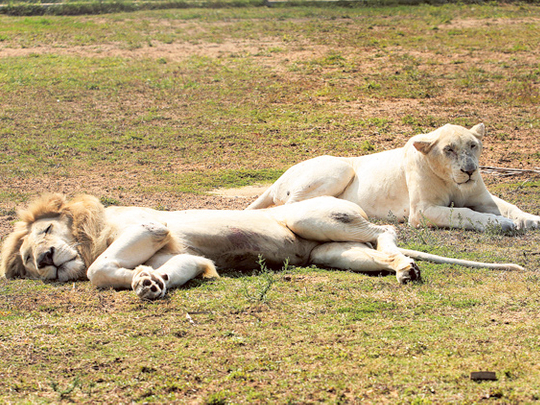
Abu Dhabi: It’s not only humans that need to cool off and stay indoors as the blazing summer kicks in. The Abu Dhabi Wildlife Centre’s around 6-year-old white lions, Shaggy and Chance, need special attention too.
The lions need protection during the summer because their skin is very susceptible to the sun and could get sunburned.
The staff at the centre makes sure they spend the day in air-conditioned rooms in their enclosure, Rone’l Barcellos, the manager of the centre, told Gulf News on Saturday.
However, the Arabian wolves at the centre have their own way to beat the heat.
Ignoring the air-conditioned room, they dig up the ground and lie down under the sand, as they would in the desert.
Most of the wild animals including big cats at the centre do not eat much during the summer.
“As the animals are less active during summer, we reduce the food slightly,” Barcellos said.
Being less active, they show little or no interest in breeding. They are active only during the early morning and late evening when it is cooler.
The centre adds electrolytes to the animals’ drinking water to help them cope with the heat.
The centre was established in 2003 to promote conservation of endangered wild animals. The one square kilometre centre houses around 400 animals and birds including lions, tigers, cheetahs and jaguars.
Shamwari, a six-year-old King cheetah, is one of the rare animals at the centre. She is one of only 30 King cheetahs alive today. The King cheetah is not a separate species of the animal but are cheetahs with a recessive gene that gives them unique spots.
Maya, a five-year-old Bengal tiger, Zulu, an 11-year-old African lion, and Bolt, a five-year-old cheetah, are some of the endangered animals housed at the centre. Two Siberian tigers also at the centre are of a threatened species as just less than 300 are alive due to habitat loss.
About 80 per cent of animals at the centre were rescued from illegal captivity.
Some wealthy people like keeping big cats at home as pets, Barcellos said. It is a big threat to these animals and she has been raising awareness against this practice.
Most of these big cats are endangered. They cannot breed in captivity and many of them die, threatening the very existence of a species, Barcellos explained.
As part of the awareness programme, animal enthusiasts can join the centre as volunteers or sponsor any particular animal for a period of time.
“Animal lovers can also donate food to the animals. By doing so, they will be involved in conservation measures and our message to raise awareness about the rights of wild animals reaches the community,” the manager said.












